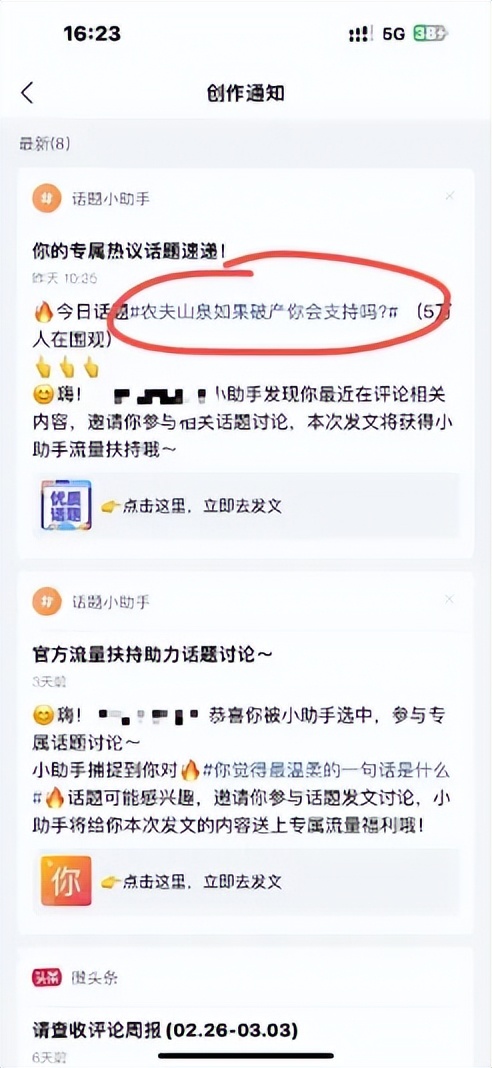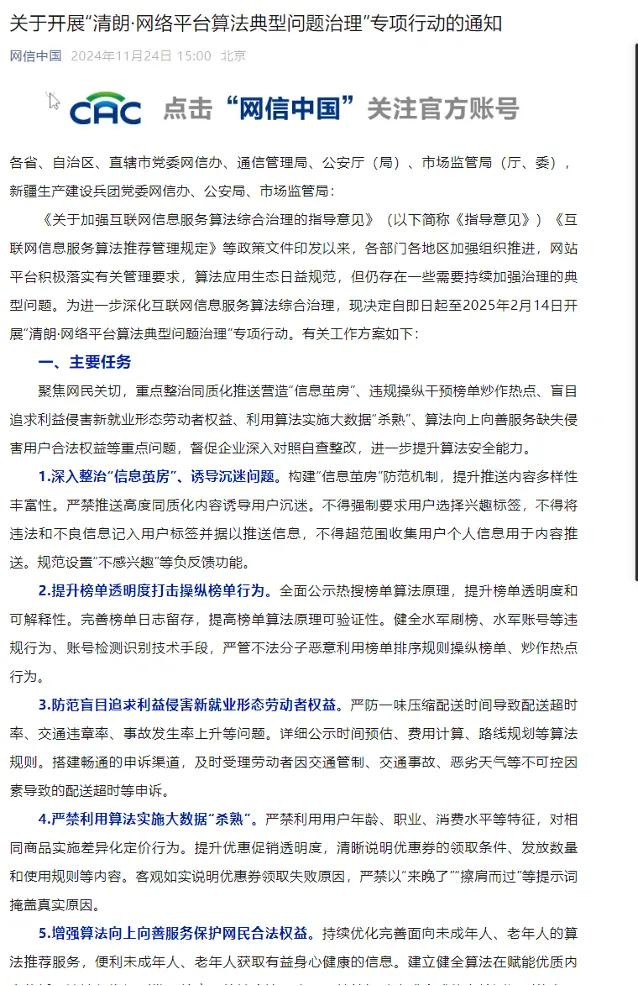Have you ever fallen into the 'traffic trap' of Toutiao and Douyin?
![]() 11/26 2024
11/26 2024
![]() 580
580
The internet has developed significantly, and public figures must be cautious with their words. However, Zhong Shanshan's remarks at the Ganzhou Media Exchange Conference left the audience feeling invigorated, like drinking ginger soup. Netizens discovered that although Zhong, China's richest man, has kept a low profile for years, he is genuine and surprisingly candid.
Zhong specifically criticized Pinduoduo, dissed live streaming sales, denounced ByteDance's algorithm, and even commented on Nongfu Spring's new products, stating that the green bottle water was a spur-of-the-moment creation to inform the public that purified water should not be consumed frequently. Due to his candor and authenticity, Zhong's speech warmed the audience's hearts but might have upset those he mentioned, such as Zhang Yiming, about whom the media has been wondering if he has apologized to Zhong and his family.

I. Will Zhang Yiming apologize? It's difficult
Anyone with normal values would think it only natural for Zhang Yiming to apologize if they understand the truth. During the online harassment Nongfu Spring faced in early 2024, Douyin and Toutiao became the main platforms for spreading related rumors, such as "Nongfu Spring products contain Japanese elements," "Nongfu Spring is not a Chinese company," and "Nongfu Spring evades taxes." These falsehoods spread widely despite repeated debunking by authoritative sources. As the actual controllers of these platforms, Zhang Yiming cannot escape responsibility and should apologize.
However, it's difficult for Zhang Yiming to make the decision to apologize and he might not even respond at all. This isn't because top executives care about their reputations. Rather, it's because:
1. Apologizing would mean admitting that there's an issue with the algorithm, which is a powerful tool for ByteDance's dominance in the internet industry.
2. If Zhang apologizes to Zhong Shanshan, others who have faced rumors and online harassment on Toutiao and Douyin may also demand apologies, leading to numerous potential problems.
3. Both Toutiao and Douyin are UGC platforms, where content is generated by users. Unlike ISPs that produce their own content and need to be very cautious about it, UGC platforms have the "safe harbor principle," providing them with more leeway to defend against infringements on the platform.
II. The abused 'safe harbor principle'
Here, I'll follow Zhong's example of candor – in the Nongfu Spring online harassment incident and many others, Toutiao and Douyin have abused the 'safe harbor principle.'
The safe harbor principle is an exemption clause for ISPs, based on the idea that 'ignorance is bliss.' If someone posts infringing content on an online platform and the platform is unaware of it, the platform does not need to bear the consequences of infringement.
The principle's original intention was good. When there's a vast amount of content on UGC platforms, it's almost impossible to conduct a thorough review. The safe harbor principle can relieve some of the review pressure on platforms.
However, this principle is easily abused. Take the example of Nongfu Spring and Zhong Shanshan. When the rumors first emerged, the platform might have been unable to detect and control them promptly. But when the rumors spread across the internet, forming a so-called 'public opinion' that persisted for a long time, they were no longer within the scope of the safe harbor principle. The platform couldn't use 'ignorance is bliss' as an excuse anymore.

Of course, it's likely that the Nongfu Spring team complained to Toutiao and Douyin during the months the rumors spread, but the platforms likely did not address the issue. This alone violates the 'notice-and-takedown' principle of the safe harbor principle, providing another piece of evidence for its abuse.
In cases like the massive rumors surrounding Nongfu Spring and Zhong Shanshan, the 'red flag principle' should be applied. When infringement is as obvious as a monkey's red behind, UGC platforms can no longer pretend not to see it and must take responsibility.
Now, the question arises: why do Douyin and Toutiao abuse the 'safe harbor principle' and pretend not to see obvious infringements? Could it be because Zhang Yiming and Zhong Shanshan have a grudge against each other? Of course not.
The answer is –
III. The evil of algorithms: maximizing traffic at all costs
The controversy surrounding algorithms in the industry, academia, and among the general public has a long history. However, past controversies and condemnations often focused on superficial issues. The public generally perceives the main evil of algorithms as 'feeding users repetitive information and consuming their time.'
Zhong Shanshan's Ganzhou speech not only created a sensation due to his celebrity status but also hit the core of the problem. Internet companies are profit-driven and rely on traffic to make money. They must bear legal responsibility for their products. Organizedly guiding and limiting traffic, arbitrarily deleting posts, rewarding traffic and rumors with money, and turning the internet into a game that manipulates people's intelligence not only undermines the legal system but also harms individuals and businesses.
For UGC platforms, the greater the traffic, the greater the benefits. Therefore, algorithms are designed to maximize traffic. Maximizing traffic involves not only continuously pushing interesting content to users but also accurately determining 'what content interests users.'
The answer is emotions. Expanding on this answer can be distressing. What emotions mobilize users' enthusiasm and participation the most? The answer is anger. It's well-known that keyboard warriors are incredibly powerful because anger is the most efficient emotion in stimulating adrenaline. Even polite individuals can become aggressive typists when angry.
Twitter and YouTube have already discovered that AI, under the goal of 'maximizing traffic and interaction,' tends to push content that provokes anger, often with conspiracy theories.
I don't know how the AI of Toutiao and Douyin compares to that of Twitter and YouTube, but given that minor incidents on these platforms can often become widely known overnight, I tend to believe that ByteDance's AI has likely also discovered the 'secret' of using anger to drive traffic.
Being surrounded by an information cocoon of Peppa Pig or legs can have different effects on one's mindset compared to being surrounded by rumors and conspiracy theories. The former might make one feel sluggish, but the latter can be debilitating.
Fully relying on algorithms to push content is already dangerous. When platform managers further encourage and induce this behavior, the consequences can be even more terrifying.

This is why Zhong Shanshan said that those who criticize him are also victims. He's absolutely right.
IV. The Cyberspace Administration of China steps in: deeply addressing information cocoons and addiction issues
As mentioned earlier, it's difficult for Zhang Yiming to apologize, as it would amount to admitting that there's an issue with the algorithm.
In reality, it's impossible to improve algorithm orientation solely through industry self-discipline and social supervision. This is a global challenge. Profit is the priority, and algorithms bring traffic. Whether it's Zhang Yiming or Li Yiming, no one would willingly hurt themselves.
Fortunately, netizens have spoken up, reflecting on the drawbacks of algorithms.
On November 24, the Cyberspace Administration of China issued a notice launching a special campaign to address typical issues with algorithms on online platforms, aiming to deeply address information cocoons and addiction issues.
The campaign will establish a prevention mechanism for information cocoons, enhance the diversity and richness of recommended content, strictly prohibit the recommendation of highly homogeneous content to induce addiction, and prohibit forcing users to select interest tags. Illegal and harmful information must not be recorded as user tags for content recommendation, nor can personal information be excessively collected for content recommendation. Negative feedback functions such as 'not interested' must be properly set up.

After reading the full text, you'll find that the issues of information cocoons, algorithm orientation, fairness, impartiality, and transparency mentioned by netizens are all addressed in the Cyberspace Administration of China's tweet. Specific work objectives and solutions are proposed, complaint and supervision channels are opened, and platforms are clearly required to take primary responsibility for security.
When industry self-discipline fails, timely intervention by regulatory authorities is crucial.
The internet is a product of civilization, and civilization should correct barbarism.






